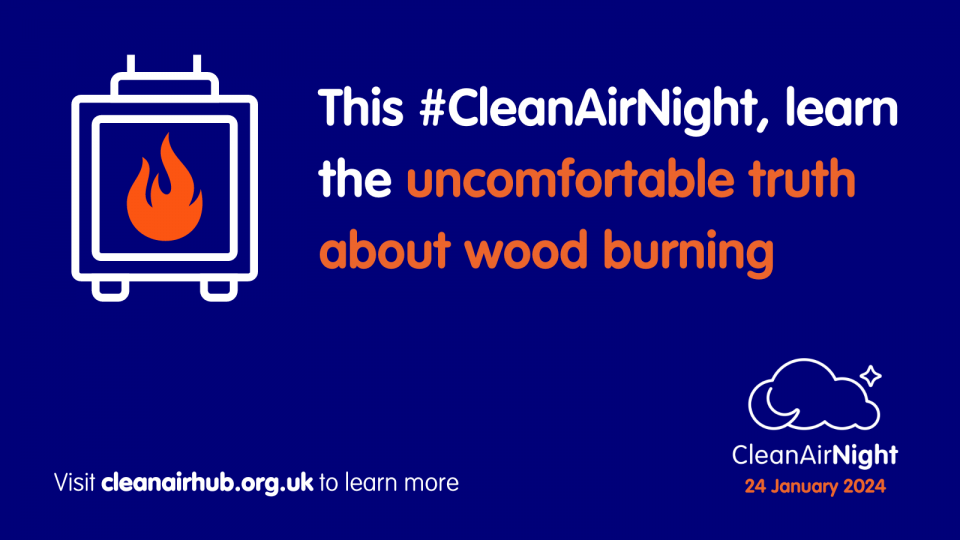#TimeToAct on wood burners
 Published: 20th Jan 2025
Published: 20th Jan 2025
Lighting fires in our homes is the largest source of harmful small particle air pollution in the UK. That is why we are supporting Clean Air Night on 22 January 2025.
Everyone wants to stay warm at home during colder weather. As part of our #TimeToAct campaign to promote better air quality in Birmingham and ahead of Global Action Plan’s Clean Air Night, we are urging residents to commit not to burn wood in their homes.
While wood burners are popular in modern homes, this heating method can negatively impact your finances, health, and the environment.
Wood burners can produce ultra-fine particulate matter (PM0.1) and various gasses. They can increase indoor concentrations of fine particulate matter (PM2.5) by 196%. Even eco-designed wood burners don't fully remove the risk of pollution.
This fine particulate can affect multiple organs and could enter our lungs through the bloodstream and even pass through the placenta in pregnant women. This can have serious consequences for our health, increasing the risk of cancer.
Burning wood produces carcinogenic substances similar to those found in cigarette smoke, such as benzene, benzo(a)pyrene, and dibenz(a,h)anthracene. In fact, wood smoke produces far more particulate pollution than cigarette smoke does, causing direct harm to our health.
Using a wood burner impacts not just the air inside your home but releases emissions into the environment through the chimney, affecting the air breathed by everybody in your community.
Hypothetical modelling by WM-Air, the West Midlands Air Quality Improvement Programme based at the University of Birmingham has revealed the scale of the impact of wood burners across the West Midlands. This study has found that a reduction of 85% of wood burning-related emissions within the West Midlands during January could lead to a 17-25% reduction in total PM2.5 concentrations.
A small amount of homes rely on burning wood for warmth, but 92% of homes with wood burners have other main heat sources like gas central heating. In many cases, wood burners are used for their style rather than being necessary for heating.
That is why this winter, as part of our mission to improve air quality in Birmingham, we’re asking you not to burn wood unless you absolutely have to.
Woodburning is not as cheap as you think
The high costs associated with gas and electricity have led many people to use wood burners. However, according to research published by Impact on Urban Health, wood burners are more expensive to heat your home than gas boilers or heat pumps.
Research shows that in a typical urban household, the annual cost of using an existing wood burner is 15% higher than a gas boiler due to the costs of purchasing logs to burn.
When a household uses a newly installed wood burner for 20% of its heat, its yearly cost is 24% more than a gas boiler., while that That cost rises to almost 50% when a household uses a newly installed wood burner for 80% of its heat.
If you have chosen a wood burner to help with your energy costs, the actual savings might not be as high as you expect.
Change your heating habits
If you need to reduce your energy costs, monitoring the ways you use your central heating and adjusting your habits accordingly could bring down the cost of your bills.
For example, simply turning down individual radiators or switching them off in any rooms that are not routinely used can help reduce the amount spent. Also, changing your settings so your heating does not come on at times while you are out could help save money.
Many gas providers now offer smart meters free of charge, helping you to monitor and track your usage. You could also invest in a smart thermostat, which allows you to manage your gas and electricity using your phone while providing data for optimising your usage.
Get help with your bills
We recommend that you check with your energy supplier if any offers are available to reduce your costs.
Log into your account or contact your energy supplier to check if you are paying too much for the amount of energy you use. If your balance is too high, you can request a partial refund, or change your direct debit to reduce your monthly payment.
If the high cost of energy is a worry, Birmingham City Council has launched its #HelpInBrum campaign to help counter the impact of rising bills.
The support available includes help and guidance on:
• improving your energy efficiency
• changing energy supplier
• finding support packages and payment plans offered by your energy provider
The council also offers crisis grants to help top-up pre-payment meters to ensure you can stay warm and safe, even if you’re struggling to pay your bills.
For more information on these programmes, visit the energy bills section of the #HelpInBrum website.
Other ways to get warm
In addition to your heating, you may wish to consider other ways of staying warm at home.
Buying items such as blankets, oversized fleece hoodies, thick socks and slippers are some obvious ways that you can reduce your reliance on using more energy. If you do need extra heat this winter, we encourage you to invest in a low-cost, environmentally friendly option, such as an electric fan heater.
If the way your heating looks matters to you, modern electric infrared heaters could also be an ideal choice. These heaters are thin and discrete panels that can be embedded into your décor, or even be disguised as a piece of artwork that can be hung on your wall. These panels work by releasing safe infrared heat, warming up nearby objects and surfaces quickly. It is low-cost, unintrusive and does not affect air quality.
Stay warm and safe this winter, but consider your options carefully. By making little changes to our habits, we can significantly improve the air we breathe. It’s #TimeToAct on air quality.